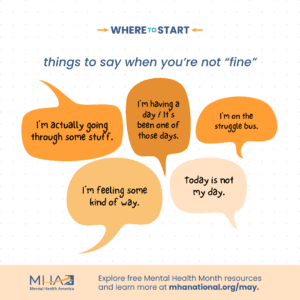This year’s theme for Mental Health Month is Where to Start: Mental Health in a Changing World. The world is constantly changing – for better or worse – and it can be overwhelming to deal with everything going on around you.
While many people feel more comfortable talking about mental health, it can still be hard to know “Where to Start” when it comes to taking care of your well-being.
This month, we’re partnering with Mental Health America to honor Mental Health Awareness Month. We hope you’ll LEARN how metal health is impacted by the world around us, ACT by learning ways to develop coping skills, and ADVOCATE for mental health in your community.

LEARN
To understand how the world around us affects our mental health, it’s important to know what factors are at play. Some things we can control, like how much screen time we have. Other things – like access to basic resources and current events – are out of our control.
Many things can impact your mental health physical health. This can include:
- economic status
- education
- geographic location
- social inclusion (friends, family or a social network)
- access to resources like nutritious food, health care, green space and transportation
Loneliness is a major contributor to mental health concerns. A 2023 Meta-Gallup survey found that nearly 1 in 4 adults worldwide said they felt very or fairly lonely. The rates of loneliness were highest in young adults ages 19 to 29 with 27% reporting feeling very or fairly lonely.
ACT

There are many ways to take action – big and small – to improve mental health and increase resiliency.
Knowing when to turn to family, friends or other positive supports when you are struggling can help improve your mental health. It’s also important to find coping skills that help you manage your mental health on a day-to-day basis. Coping skills are tools to help you handle stress and difficult emotions.
Examples include:
- Establishing and maintaining boundaries
- Getting regular physical activity
- Making to-do lists and setting goals
- Asking others to help or assist you
Seeking professional help for your mental health when self-help efforts aren’t working is a sign of strength, not weakness. You don’t have to go through these struggles alone. Foundation 2 Crisis Services is a free, 24/7 resource for when life gets tough.
ADVOCATE
There are things everyone can do to improve the way mental health conditions are perceived and treated. How you talk about mental health is critical. Language can perpetuate stigma or help break it down. Learn more about why how we talk about mental health matters with CEO Emily Blomme on our podcast “When Life Gets Tough.”
We can help you integrate mental health conversations and support into your workplace, home or community. Our crisis counselors are available 24/7 to provide a listening ear and help you make a plan to stay safe. We also offer community and workplace trainings on suicide prevention and mental health care. Email kcurtis@foundation2.org to learn how you can bring advocacy and education to your group.
Being able to maintain good mental health is essential to every individual’s overall health and well-being. Mental health conditions are common, manageable and treatable.
It is never too soon to seek treatment for your mental health. Getting help early saves lives.
In crisis or have questions? We can help. Our trained, compassionate counselors are available 24/7 at 988 or 319-362-2174. You can also text 988 or chat with us at foundation2.org.

